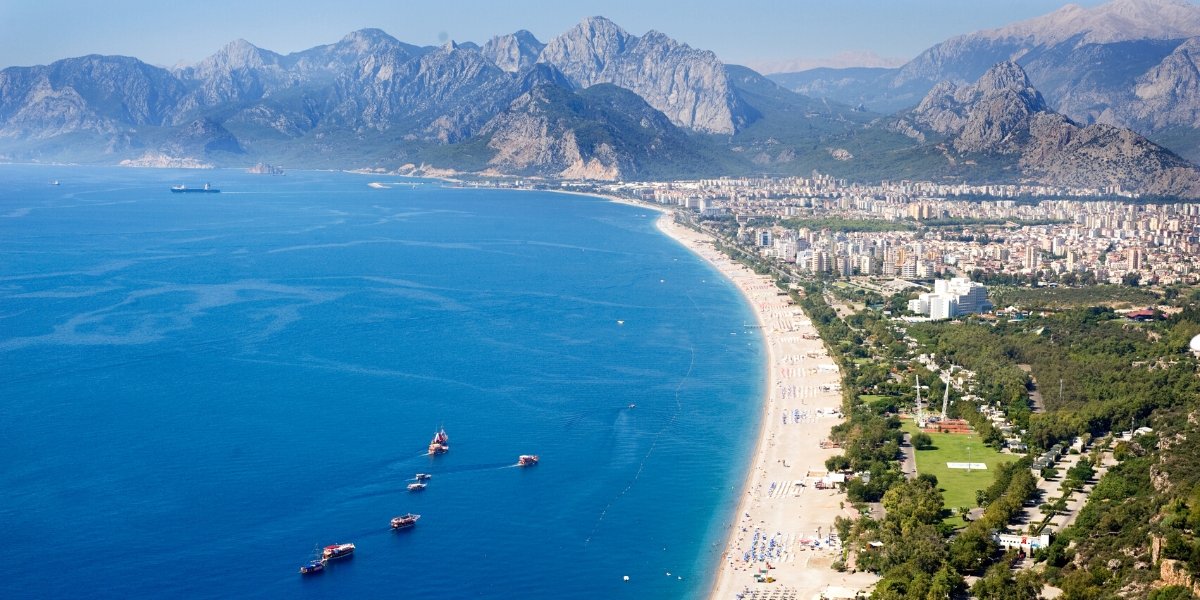From the bustling streets of Istanbul to the stunning landscapes of Cappadocia and the pristine beaches along the Mediterranean and Aegean coasts, Turkey has something to offer every kind of traveler. But when should you experience Turkey’s many delights?
Spring (April to June)
Section Type: standardWidthImageS
The enchanting Blue Mosque.

Spring is arguably one of the best times to visit Turkey. The weather is pleasantly mild, making it ideal for exploring both the cultural and natural wonders of the country. During this season, you can expect temperatures ranging 59°F to 77°F in most regions.
Istanbul: Spring in Istanbul is enchanting. The city's gardens and parks come alive with colorful flowers, and outdoor attractions like the Hagia Sophia and the Blue Mosque are less crowded.
Cappadocia: Spring is a fantastic time for hot air ballooning over Cappadocia's surreal landscapes, as the weather is usually stable with clear skies.
Coastal regions: The Mediterranean and Aegean coasts begin to warm up, making it a good time for beach vacations without the intense summer heat.
Summer (July to August)
Section Type: standardWidthImageS
The expansive beach in Antalya holds a stunning backdrop of the Beydaglari Mountains.

Summer is the peak tourist season in Turkey, attracting travelers from all over the world. The weather is hot and dry, with temperatures often exceeding 86°F in many parts of the country. If you enjoy sun, sea, and a vibrant atmosphere, this is the time for you. It goes without saying, however, that some spots can get rather crowded at this time of year.
Beaches: The coastal regions, including Bodrum, Antalya, and Fethiye, are in their prime during summer. You can indulge in water sports, sunbathing, and beach parties.
Festivals: Istanbul hosts various cultural festivals during the summer, such as the Istanbul Jazz Festival.
Fall (September to November)
Section Type: standardWidthImageS
These unique hoodoo rock formations in Cappadocia are more known as ‘fairy chimneys’ and has quite the fascinating legend behind the name.

Fall is another excellent time to visit Turkey, especially if you prefer milder temperatures and fewer crowds. During this season, the weather remains warm, with temperatures ranging from 68°F to 86°F in most regions.
Cultural heritage: Exploring Turkey's historical sites, such as Ephesus and Troy, is more enjoyable without the summer heat, and you'll have a chance to appreciate the rich history without large crowds.
Cappadocia: The unique landscapes of Cappadocia are breathtaking in the autumn colors, making it an ideal time for hiking and outdoor activities.
Food and wine: Autumn is harvest time in Turkey, making it the perfect time to savor delicious local produce and wines at their freshest.
Winter (December to February)
Section Type: standardWidthImageS
Mount Uludağ is an amazing spot in Turkey for snow sports.

While winter in Turkey can be cold, especially in the eastern regions, it's a fantastic time to explore the country's cultural heritage, go skiing, or experience unique festivities. Istanbul, for example, experiences relatively mild temperatures with average highs ranging from 46°F to 55°F, occasional rainfall, and a small possibility of snowfall.
Ski resorts: Turkey has several ski resorts, among them Uludağ and Palandöken, where you can enjoy winter sports.
Cultural sites: Istanbul and other cities are less crowded in winter, allowing you to explore museums, palaces, and historic sites with fewer tourists.
Unique festivals: Experience the magic of the Istanbul Tulip Festival in April and the Whirling Dervishes performances year-round.
Section Type: cta
Turkey has loads to offer in every month of the year, with each distinct season offering a different set of experiences. The best time to visit depends on your interests and what you hope to see and do. Once you’ve decided what kind of Turkish delight you’re after, allow SA Expeditions to do the rest. We’ve got a few sample itineraries and a team of Destination Experts eagerly awaiting the opportunity to build your bespoke Turkish adventure.

 Europe
Europe Europe
Europe